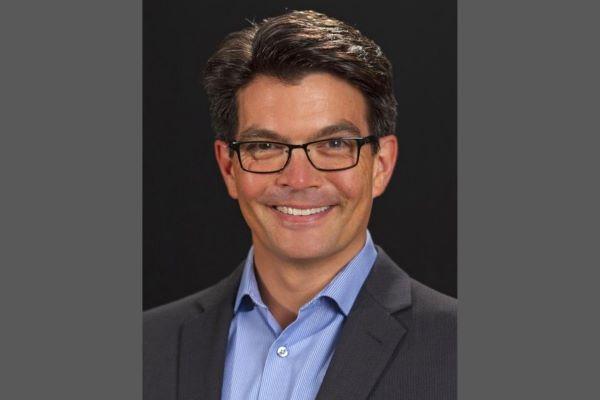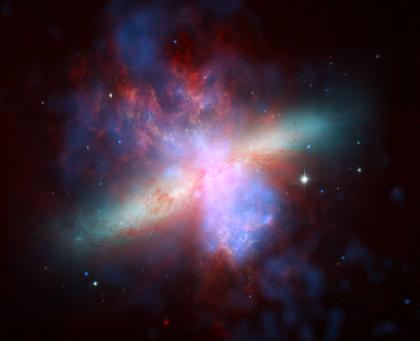Q&A faculty spotlight: Todd Thompson

Todd Thompson is the Allan H. Markowitz Endowed Chair in Astronomy, Professor of Astronomy with a courtesy appointment in the Department of Physics, and a Distinguished University Scholar. His research interests include theoretical astrophysics, starburst galaxies, supernovae and gamma ray bursts. A member of the Ohio State faculty since 2007, Dr. Thompson is the recipient of an Alfred P. Sloan Foundation Fellowship and a Simons Foundation Fellowship in Theoretical Physics.
Please list your educational history including degrees earned and universities attended.
BA with majors in physics and philosophy at Lawrence University (1993-1997)
MS and PhD in physics at the University of Arizona (1997-2002) - PhD is in theoretical astrophysics, with a focus on massive star supernova explosions
Hubble Postdoctoral Fellow at UC Berkeley (2002-2005)
Lyman Spitzer Jr. Postdoctoral Fellow at Princeton University (2005-2007)
Please describe your current research/creative activity or area(s) of interest.
I am a theoretical astrophysicist, which means that I attempt to interpret the observations we make of the cosmos with our various telescopes. My research focuses on several outstanding problems.
Supernova explosions and the origin of the heavy elements: massive stars (with a mass more than about 10 times the mass of our Sun), collapse at the end of their lives under the weight of their own gravity. Some explode as supernova explosions, leaving behind neutron stars (sometimes “pulsars” or “magnetars”), and some collapse to black holes. I work on understanding the dividing line between “successful” explosions and failed collapses. This is especially important because massive stars and their supernova explosions enrich the universe with oxygen and other elements, providing the ingredients for life. They also inject energy into the medium of a galaxy, driving turbulence and gas motions and setting the stage for new star formation.
I also work on the physics of galaxies. I think most people just think of galaxies as sitting there in space, not doing anything, but they are teeming with activity. There is a complex and still not fully understood cycle where gas in the interstellar medium of galaxies collapses because of gravity and forms stars and star clusters, and then those stars push and stir the surrounding gas, driving turbulence, that then regulates the formation of future stellar generations. I study this cycle and one of its most dramatic consequences: galactic winds. It turns out that when a galaxy forms stars very fast and in a small volume – a “starburst” – (usually because there is a lot of gas, usually caused by an interaction or merger with another galaxy) that the massive stars drive outflows of gas from the galaxy, shutting off further star formation. Here is a picture of that kind of galactic wind from the famous nearby galaxy M82.

I study the process of how that gas is accelerated out of the galaxy, and try to predict the properties of such systems.
More images of M82: starburst galaxy with a superwind and Cigar galaxy
What/who influenced you to select your area(s) of study and how has that impacted your career?
As a kid, I was probably always interested in science, and my family encouraged me. In high school, I became more interested in physics because of a project I did on Einstein’s Special Relativity. The concepts of time dilation and length contraction when objects move close to the speed of light captivated me. My parents and grandparents encouraged me to pursue it and to go to college. Although none of them had college degrees, there was seemingly never any question that I should go, and they consistently encouraged me to pursue my interests in science and the humanities. I had no career picked out at that time, but I knew I wanted to know more about how things work and why, and that I wanted to be immersed in a place with like-minded people. I found that at Lawrence.
At each stage in my career, I had wonderful mentors that helped me get better at the skills I needed and who encouraged me to develop as a person. These include a number of professors at Lawrence, Lawrence University. In graduate school, I found my way into theoretical astrophysics through courses on particle physics and thermodynamics and eventually to my PhD advisor. As a researcher, I had wonderful collaborations with colleagues. Here, at Ohio State, I’ve been lucky to have many excellent colleagues who consistently inspire me to think in different ways and to solve new problems. Ohio State’s astronomy department is one of the best in the world and it’s a treat to come in every day excited to talk to my colleagues here about our science.
What undergraduate classes do you teach?
I have taught several GE courses at the undergraduate non-major level. The one I’ve taught most often recently is Astronomy 1101 Planets to Cosmos, which covers everything from the motion of the planets on the night sky to the physics and evolution of stars, to galaxies, the structure of the universe, and the Big Bang.
Why do you think a student should take these classes and, if appropriate, why would they be of interest to students majoring in other disciplines?
Everyone should be exposed to science at some level. It’s critical to understand how we know things, and why. I don’t mean the things themselves, necessarily, but the process of finding things out, refining ideas about how things work, and testing and rejecting those ideas. Astronomy is a beautiful subject and a great environment to teach and to practice those concepts. How do we know the Earth is a sphere? How do we know that the Earth orbits the Sun? How do we know that we live in an expanding universe, or that there is a supermassive black hole at the center of the Milky Way? What are the arguments for the existence of Dark Matter? In each case, there are a serious of observations and a series of physical arguments that lead to a conclusion. If you reject the conclusion, you are forced to reject one of your assumptions or one of your physical principles. This is how you learn about the world and how you figure out that things are true. In an age of mis-information and in an age where some people often and confidently proclaim things that are demonstrably wrong, these skills are critical for everyone, even in situations where there are ambiguities.
What aspects of your teaching give you the most satisfaction?
The most satisfying pieces are when I’m helping students learn how to think about the world, even if just a little. It’s also satisfying to see students get a hold of a subject or a topic and understand it and start to see connections to adjacent topics and ideas.
If there are opportunities for undergraduates to connect with you for research or creative activity, please share what this would be and how students should reach out to you.
Students can reach out to me and other professors by email. Many professors are busy, but they can sometimes find time to talk, and sometimes find independent studies or research projects for students to work on or read about. For example, a 1-credit S/U independent study can be a good way to get to know more about a research question and a professor’s way of working in that space.
What book/movie would you recommend or what music do you enjoy?
So much depends on someone’s mood and interests! I have a hard time recommending specifics, but:
For non-fiction, the books I often recommend are The Making of the Atomic Bomb by Richard Rhodes and The Rise of Theodore Roosevelt by Edmund Morris.
For fiction, Tinkers by Paul Harding. I also recently read and enjoyed Foster by Claire Keegan and Klara and the Sun by Kazuo Ishiguro.
Movies: Wow. So many! But, if I had to pick one right now, maybe the 2009 sci-fi movie Moon.
Music: Same. So many! But, if I was going to pick some things, I would say Bach’s D Minor Partita for solo Violin and Chopin’s Op 27 No 1 Nocturne in C-sharp Minor. Also, lots of alt-rock and pop, including some songs from 21 Pilots to Taylor Swift to Caamp to Audioslave to …
What is the most interesting place you have visited?
I’ve been lucky enough to have tremendous experiences in Tokyo and Kyoto, in Beijing and Shanghai, in Rome, Florence, Berlin, Munich, and others. Most of these have been conferences. What’s the most interesting? All of the experiences I remember most come from simply sitting, or from going alone into a restaurant full of locals, or from walking to a high place to get a view. Once, I sat near a shrine in Japan for hours on a calm quiet rainy day before a woman came up to ask me if I would like to learn how to pray. I learned from her and we talked about where else I should visit. Another time, I sat in St. Peter’s cathedral in Rome for hours, watching people, and watching them look at Michelangelo’s Pietà. I unexpectedly heard a choir and saw a processional. Many times in my travels I’ve eaten alone in small restaurants full of locals, with no help on the language. I’ve always been treated as an honored guest, even as people talk among themselves trying to figure out what food to bring me. Wherever you go, my advice is to walk and then sit for a long time and take things in and then find a place to eat by looking for full restaurants with lots of people from whatever town or city you’re in.
What is the best advice you have received?
Be curious. Try new things. Enjoy yourself.
What advice would you give to undergraduate students?
The same: Be curious. Try new things. Enjoy yourself.
Feel free to stop by my office hours. I love to talk about _________________.
I’m always happy to talk about anything. As I tell my students in class: feel free to ask me any question, on any topic, at any time. I don’t have formal office hours this semester, but I’m happy to take email.
Would you like to share a fun/interesting fact about yourself?
I love swimming and the ocean. I was a pretty average D-3 swimmer in college, and I continue to swim most mornings.
I took up the piano in College, and I’ve now had a total of about 12 years of lessons. I’m working on mostly classical pieces. My current project is the C-sharp minor prelude by Rachmaninov. Last year, I worked on Chopin’s Fantasie Impromptu.
Learn more about Professor Thompson’s work, email, and office location on this department page.
